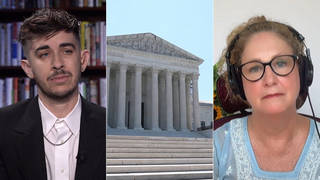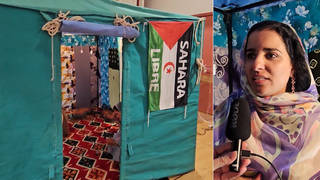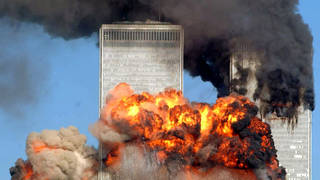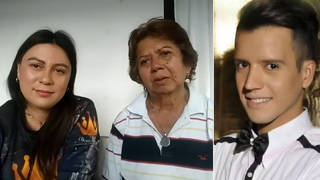
Guests
- Kenneth Rothexecutive director of Human Rights Watch, which has been outspoken in its criticisms of the military commissions system. He attended the opening the 9/11 military tribunal at Guantánamo Bay over the weekend and wrote about it for the New York Times in a piece called “Justice Cheated.”
The military tribunal established to prosecute the five leading suspects in the September 11th attacks opened this weekend at Guantánamo Bay. During a nine-hour hearing on Saturday, the five prisoners refused to enter pleas on murder and terrorism charges, or to talk or listen to the judge, in what one of their lawyers explained was a “peaceful resistance to an unjust system.” Defense attorneys say the trial for the five leading suspects in the September 11th attacks is rigged to lead to their execution. Critics say the Obama administration has set a dangerous precedent by proceeding through a military tribunal. After initially attempting to move the case to a civilian courtroom in New York, the White House caved to vocal opposition and agreed to resume the military commissions begun under President George W. Bush at Guantánamo. At least one defense attorney argues it will be impossible to present testimony against his client that is not corrupted by treatment he says amounted to torture. “Waterboarding is mock execution by way of drowning. That is a classic act of torture. Bush has admitted ordering that. There is no escaping the fact that he should be a criminal suspect, as should the other people in the room, people like Tenet, Rumsfeld, Cheney,” says Kenneth Roth, executive director of Human Rights Watch, who attended the military trial at Guantánamo this weekend. “I think President Obama has simply decided that he’s not willing to invest the political capital that would be required for those kinds of difficult trials.” [includes rush transcript]
Transcript
AMY GOODMAN: The military tribunal established to prosecute the five leading suspects in the September 11th attacks opened this weekend in Guantánamo. During a nine-hour hearing Saturday, the five prisoners refused to enter pleas on murder and terrorism charges. Defense attorneys said the judicial process was rigged to lead to their clients’ executions. Throughout Saturday’s arraignment, the prisoners refused to talk or listen to the judge. Several delayed the hearing by praying. One prisoner was brought to the court in restraints. A lawyer for one of the prisoners said their actions were a “peaceful resistance to an unjust system.”
The self-proclaimed “mastermind” of the 9/11 attacks, Khalid Sheikh Mohammed, is being tried with Walid bin Attash, Ramzi bin al-Shibh, Ali Abd al-Aziz Ali and Mustafa Ahmad al-Hawsawi. The charges can carry the death penalty. The five defendants will now be asked again to enter pleas of guilty or not guilty at a later hearing.
However the suspects plead, critics say the Obama administration has set a dangerous precedent by proceeding through a military tribunal. After initially attempting to move the case to a civilian court in New York, the White House caved to vocal opposition and agreed to resume the military commissions begun under President Bush at Guantánamo.
Kenneth Roth is the executive director of Human Rights Watch, which has been outspoken in its criticisms of the military commissions system. He attended the opening of the 9/11 military tribunal at Guantánamo over the weekend and wrote about it for the New York Times in an op-ed piece called “Justice Cheated.” Kenneth Roth joins us now.
What was it like to be in Guantánamo this weekend?
KENNETH ROTH: Well, I have to say that that—I went there understanding how unfair the proceedings would be. The judge, I do think, bent over backwards to be fair, but there were real constraints on what he was able to do. I mean, first of all, the defendants came in complaining about mistreatment, not simply the historic torture that we all know about, but even mistreatment on the day of the proceeding, where they were not given clothes that their attorneys had brought. As you mentioned, one of them was brought in with restraints. We don’t even know why that happened. They were ultimately removed. But the idea of holding trials in this, you know, highly militarized setting where the defendants are not even able to talk to each other in prison—the time they were sitting in court was the first time, I think, in years that they’ve been able to speak with each other, which of course makes it difficult to prepare a common defense. But just that setting is so different from what would have happened if Obama’s initial idea had been pursued, which is to try the people in the federal courthouse in southern Manhattan. That, I think, would have set up the possibility of a much fairer trial. But, as you mentioned, Obama caved to pressure.
And if you look at what that pressure was, I mean, some people complained about security, although I think that that, you know, is ridiculous, because I used to work in that courthouse. There are—you know, there have been Mafia dons tried there, you know, drug-trafficking kingpins, terrorists. You know, people don’t even know that it’s happening. I mean, as I mentioned in my op-ed, much less disruption for those big trials than there is for the Thanksgiving Day parade. So, you know, I think that that was really a fake issue.
Some people complained that it was inappropriate to treat these suspects as common criminals, as opposed to enemy combatants. Now, I think that has it backwards. I mean, when you treat these people as enemy combatants, that allows Khalid Sheikh Mohammed to stand up, as he did the last time he appeared in court, and to say, “I’m just like George Washington. You know, the British considered George Washington an enemy combatant. I’m proud to be an enemy combatant.” I mean, the problem is a combatant is a glorified standing, whereas a criminal suspect is, frankly, you know, what the perpetrators of 9/11 deserve to be called.
AMY GOODMAN: You know, I was watching MSNBC, and one of the hosts was just outraged that these prisoners were allowed not to listen to the judge, they weren’t putting on headphones for translation. Someone else who was down there watching was your colleague over at the ACLU, executive director of the ACLU, Anthony Romero, who wrote a piece called “The Shame of Guantánamo: A Close-Up View of Injustice.” Part of what he wrote, he said, “The government has sought with a missionary zeal to prevent any public testimony or evidence about how the accused have been treated while in U.S. custody. I experienced that less than an hour into Saturday’s hearing, when the word 'torture' came up. Censors immediately cut off the audio feed, which was on a 40-second delay to courtroom observers behind a soundproof glass.
“At issue was the defendants’ refusal to wear headphones for an Arabic translation of court proceedings. David Nevin, counsel for Khalid Sheikh Mohammed, explained that Mohammed didn’t want to use headphones because of [quote] 'past experiences.' [unquote] Presumably, this referred to when the defendants were forced to wear headphones and subjected repeatedly to loud music blasted into their ears while in custody.”
KENNETH ROTH: Exactly.
AMY GOODMAN: Now, you get no reference to this in the media when they talk about the special treatment and the outrage of these guys saying they just don’t want to listen.
KENNETH ROTH: Yeah, no, I mean, that was, you know, frankly, part of it. I think they also didn’t want to recognize the judge. And so, the initial refusal to respond to questions, I think, was their statement about the unfairness of the proceedings. Now, you know, interestingly, they did end up cooperating with the proceedings extensively thereafter through their attorneys, so it wasn’t as if they obstructed what went on. And indeed, the court accomplished what it wanted to accomplish on that first day.
But I think they have very good reasons to complain about the unfairness. And I would say two. I mean, one is structural. In federal court, you have an independent tribunal. The judge is independent. He or she has life tenure. You have—you know, basically, the defense can operate on its own. They don’t have to ask permission to conduct an investigation. The jury pool is chosen randomly from the community. All that is the opposite in Guantánamo. In Guantánamo, under these military commissions, the military picks the judge, or in this case, the chief judge, who chose himself to be the presiding judge of the trial. The military actually chooses the jury pool. I mean, they can go around and look for a hanging jury. They can say, you know, “Which officers here do we think are going to be most against these defendants?” and put them in the jury pool. There’s nothing to stop that. And the defense, when they want access to investigative resources, actually have to ask the prosecution first, so there’s no surprise, there’s no ability to mount a secret defense. So this, just structurally, is very different from what you would expect in a federal court.
AMY GOODMAN: And this issue of not being able to raise the issue of torture?
KENNETH ROTH: Well, the issue of torture is going to come up. I mean, clearly, the government wants to keep that out, and they have classified any reference to the prior treatment of the suspects. So, you know, even when you chitchat with the defense attorneys, they can’t talk to you about this. You know, now, it will be relevant if, for nothing else, then the defense got the judge to agree that the torture of the defendants in CIA custody is relevant for what’s called mitigation—that is, the argument, assuming that they’re convicted, that they should not be given the death penalty, because of mitigating circumstances. So, torture is going to come up at the trial. I suspect it will come up in a classified, closed hearing.
And I think the reason for that is partly, obviously, just to avoid embarrassment to the U.S. government. But I think there’s actually something more sinister here. We all know that President Obama has adopted this policy of looking forward, not back, with respect to the Bush torture. And what he is trying to avoid at all costs is an evidentiary record of torture, which would then build the pressure on him to permit an independent investigation, and ultimately a prosecution, of the senior officials who authorized torture, which we know go all the way to the top, to the former president. So I think that there is a very determined effort here not to permit a public evidentiary record of torture. We all know it happened, but that’s very different from having the evidence on the record.
AMY GOODMAN: Do you think President Bush should be charged with war crimes?
KENNETH ROTH: There’s no question. Whether it’s war crimes or whether it’s torture, he authorized the waterboarding, if nothing else. Waterboarding is mock execution by way of drowning. That is a classic act of torture. Bush has admitted ordering that. There is no escaping the fact that he should be a criminal suspect, as should the other people in the room, people like Tenet, Rumsfeld, Cheney. So, yes. And Obama knows that, as well. So even though I think he might countenance, you know, lower-level prosecutions, that’s not possible in this case, because this was not, you know, some low-level interrogator off on a lark doing his own thing. These were interrogators following orders from the top. And I think President Obama has simply decided that he’s not willing to invest the political capital that would be required for those kinds of difficult trials.
AMY GOODMAN: Before you go, Ken, I wanted to ask you about what’s happening in Bahrain. One of the most prominent human rights activists remains in jail after being detained on Saturday. Nabeel Rajab, who heads the Bahrain Center for Human Rights, was arrested when he returned from a trip to Lebanon. He’s been accused of taking part in and calling for an illegal gathering and march. This is a clip of what he had to say recently on Democracy Now!
NABEEL RAJAB: We have a very aggressive ruling regime. We have a regime that violated—committed a lot of crimes in the past one year. Last year at this time, I spoke to you, Amy, and I told you we have around 20 people died; now I’m telling you more than 80 people were killed, thousands of people were detained, thousands of people were targeted in their work and fired from work…
AMY GOODMAN: That’s Nabeel Rajab. He’s in jail. Abdulhadi Alkhawaja, leading human rights leader in Bahrain, is on a hunger strike now for three months, near death, they have said. Where is President Obama on this issue? I mean, Bahrain is a central U.S. ally; it’s the home of the Navy’s Fifth Fleet.
KENNETH ROTH: Well, the U.S. government is, as far as we understand, pushing quietly for the Bahrain monarchy to release these political prisoners, as it promised to do. The King of Bahrain, to his credit, authorized an independent investigation into what had happened. A report was delivered. It recommended, among other things, that the political prisoners be released, that the torturers be prosecuted. The King said, “Yes, we’ll do that.” But the King is not entirely in charge, despite his title. There are hardliners within the royal family who are opposing that and who, these days, are prevailing. And so you see these political prisoners still in prison, and that’s what this hunger strike is about. That’s what this latest arrest is about.
AMY GOODMAN: We’re going to have to leave it there, but we’ll do an exclusive online. Kenneth Roth is executive director of Human Rights Watch. Prior to joining Human Rights Watch, he was a federal prosecutor in New York.













Media Options